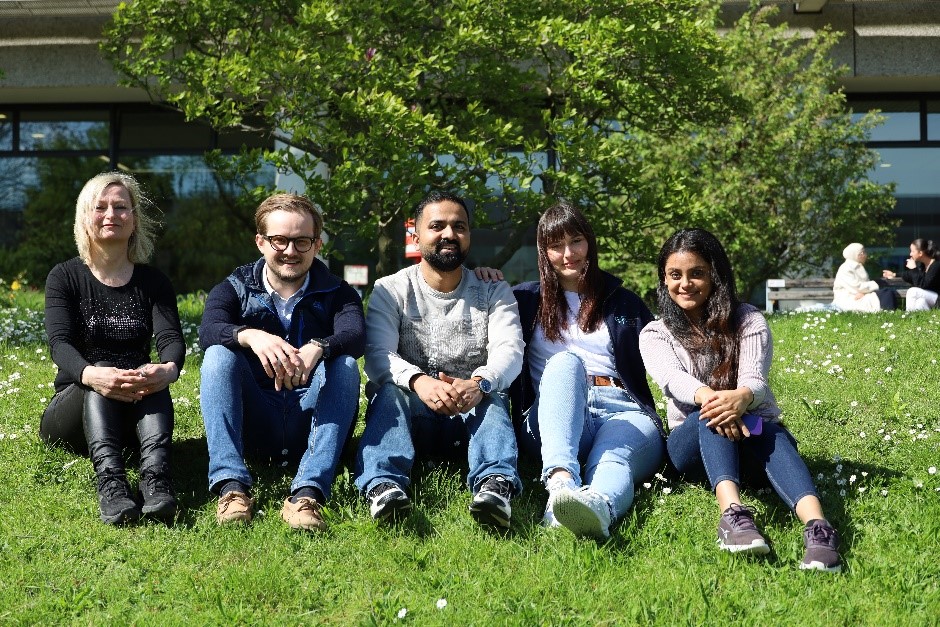Research Group Dr. med. Bernd Heinrich
The Heinrich lab investigates the immune response and the tumour microenvironment in hepato-pancreaticobiliary tumours and liver metastases. Dr Bernd Heinrich is funded by the Max Eder Junior Research Group Programme and the Else Kröner Memorial Scholarship and is group leader in Research Training Group 2978 “Understanding and exploiting adaptation in gastrointestinal cancers”.
Junior Research Group Dr. med. Bernd Heinrich
The Heinrich lab investigates the immune response and the tumour microenvironment in hepato-pancreaticobiliary tumours and liver metastases. The aim of the Heinrich research group is to gain a precise understanding of the immune network in the tumour environment, taking into account influencing factors such as underlying liver disease or the microbiome as part of the ‘Gut-Liver-Axis’. One focus is on research into the response of innate immune cells such as innate lymphoid cells (ILCs) and the influence of metabolic dysfunction-associated steatotic liver disease (MASLD) on the immune microenvironment. The translational aim of the Heinrich group is to optimise, develop and refine immunotherapies for use in patients with hepato-pancreaticobiliary tumours. The laboratory uses state-of-the-art molecular biology methods including multiparameter spectral flow cytometry, single-cell sequencing, bacterial sequencing and mouse models of hepato-pancreaticobiliary tumours.
Dr Heinrich has been funded by the Max Eder Junior Research Group Programme of German Cancer Aid since April 2023. The project focuses on the influence of innate lymphoid cells on the tumour microenvironment in hepatocellular carcinoma (HCC) (title: ‘Deciphering the function and therapeutic potential of innate lymphoid cells in the immune network of liver cancer to overcome resistance to immunotherapy’; https://www.mhh.de/presse-news/mit-zellen-des-angeborenen-immunsystems-leberkrebs-bekaempfen)
Since September 2024, Dr Heinrich has been funded by the Else Kröner Memorial Fellowship of the Else Kröner-Fresenius Foundation. The project focuses on the interaction of innate lymphoid cells with bacteria in subgroups of cholangiocarcinoma (title: ‘Deciphering the interaction of innate lymphoid cells and microbiota in subtypes of cholangiocarcinoma’; https://www.mhh.de/presse-news/immuntherapie-gegen-gallengangskrebs-wirksamer-machen)
Dr Heinrich is group leader of the Research Training Group (RTG) 2978 and, together with Professor Albrecht Neeße from the University Medical Centre Göttingen (UMG), will investigate the adaptation of the microbiome and immune system to chemotherapy in cholangiocarcinomas and pancreatic carcinomas. The planned start of the project is October 2025 (title: ‘Investigation of the adaptation of the microbiome and the immune environment in BTC and PDAC by systemic therapies’; https://www.umg.eu/presse/news-detail/news-detail/detail/news/rechts-und-migrationsforschung-verbinden-sowie-therapien-bei-tumoren-anpassen/)
Further information
The AG Heinrich is currently (January 2025) looking for a medical student to support the project: ‘Deciphering the interplay of innate lymphoid cells and microbiota in subtypes of cholangiocarcinoma’, funded by the Else Kröner Memorial Scholarship. The position comes with a stipend for the student and requires a 9-month suspension from studies analogous to the StrucMed programme (Hannover Medical School : StrucMed). Please send applications directly to heinrich.bernd@mh-hannover.de
For the Research Training Group 2978 and the project ‘Investigation of the adaptation of the microbiome and the immune environment in BTC and PDAC by systemic therapies’, we are looking for a medical student and a PhD student for 10/2025. A call for applications will be published soon. Stay tuned!
Max Eder Junior Research Group: https://www.mhh.de/presse-news/mit-zellen-des-angeborenen-immunsystems-leberkrebs-bekaempfen
Else-Kröner-Memorial Scholarship: https://www.mhh.de/presse-news/immuntherapie-gegen-gallengangskrebs-wirksamer-machen
Research Training Group 2978: https://www.umg.eu/presse/news-detail/news-detail/detail/news/rechts-und-migrationsforschung-verbinden-sowie-therapien-bei-tumoren-anpassen/
Our Research Group

You will find an overview of our employees in the following drop-down boxes. If you have any further questions about our team, you can contact us at any time.
Bernd Heinrich, MD
Hanover Medical School (MHH)
Department of Gastroenterology, Hepatology, Infectious Diseases and Endocrinology
Carl-Neuberg-Str. 1
30625 Hannover
Germany
Telefon +49 511 532-81689
heinrich.bernd@mh-hannover.de

- Dr. Sachin Kumar Singh Chauhan (Postdoc)
- Ms. Tijana Ristic (M. Sc., PhD student)
- Ms. Suparna Dey (M. Sc., PhD student)
- Ms. Ulrike Opel (Technical assistant)
- Ms. Laura-Christin Kusche (cand. Med., KlinStrucMed fellow)
